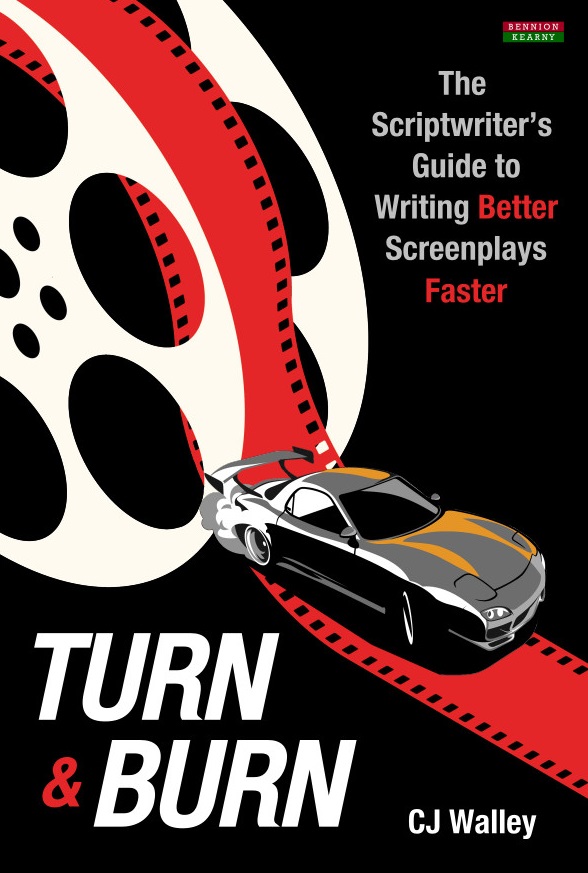An excerpt from Chapter 8 of Turn & Burn: The Scriptwriter’s Guide to Writing Better Screenplays Faster by CJ Walley
I’ve yet to hear of any screenwriter reaching some kind of pinnacle in their career where all their worries and fears drained from them. If you care a great deal about being talented, being appreciated, and being valuable now, you won’t stop caring about that later. Watch the documentary Seduced & Abandoned (2013) and note how Alec Baldwin struggles to get a movie funded, and how Francis Ford Coppola once became so upset he couldn’t get a new project off the ground he threw his Oscars out of a window.
This is the reality many don’t want to witness or accept. There is no mountain top in which to place a flag and call it a day. Becoming a finalist in a competition isn’t the end; just like getting a read request, selling a spec, getting a script produced, or getting critical acclaim isn’t the end. History is littered with creative after creative who’ve found huge audiences and huge fortunes only to feel the same (if not worse) than they did when they started because they’ve become distanced from the process, or it’s turned ugly for them. Many of those artists simply cannot understand why they feel so bad when, on paper, their life seems so good. We see it in other forms of the creative arts; the musician who gets a record deal but forgets their roots, the actor who sells out and loses respect from their fans, and the same principle absolutely exists within screenwriting too. Our relationship with the process always remains, regardless of our successes, so it’s essential we find peace with it and do not let it get caught up with our career aspirations.
Example: In the book Hollywood Animal, legendary writer Joe Eszterhas details his journey from senior editor for Rolling Stone magazine to Hollywood screenwriter. A sucker for research, Eszterhas would take his time to not only travel across America to study the subjects of his writing but also integrate into their worlds for an extended time. This methodology got results for him with F.I.S.T. (1978) starring Sylvester Stallone, which was a huge hit at the box office.
When back home writing, however, this bullish man who seemed to fear no one or anything was privately dealing with an issue where he’d have to vomit every morning before writing, and he didn’t know why. This went on for three years until he received what he describes as the “best writing advice he ever got” from Sophie’s Choice (1982) producer Alan J. Pakula. After Eszterhas turned in a very poor draft of his latest script, Pakula told him to forget the research, stop looking for real-life people to base his characters on, and instead make everything up. Eszterhas did just that, had the most fun he’d ever had writing a screenplay, and immediately stopped throwing up in the mornings. What he’d been suffering from before was stress. Stress brought on by unreasonable pressure he’d put on himself to write something accurate over something artistic. His existing writing process hadn’t been healthy for him at all, while his new one let his inner artist shine. Joe Eszterhas would famously go on to sell his Basic Instinct script for $3m after a bidding war, and secure a front fee of $2m to write Showgirls based on the idea he quickly scribbled onto a napkin. These two movies alone would go on to earn a billion dollars.
Careers aren’t just built on talent, though; they’re built on luck and personality too, which can sometimes make them a poor barometer of artistry. Some artists can make the mistake of attributing a lack of success as being down to a lack of talent, while other artists can feel imposters despite success. Both issues are rooted in them allowing the writing process to go from something they love to something they loathe.
In some ways, all the stress and anxiety we can feel when writing is the curse of having a vibrant imagination that paints an intense image of what lies ahead for us. We have to remind ourselves that, while we have the ability to picture success vividly, it’s unreasonable to expect reality to meet our expectations, even if we hold up our end of the deal. We have to learn to enjoy writing now and quit stressing about the future. This isn’t just so we can tackle working in film; there’s a huge break in industry standing between us and the production world that targets new writers from day one. Some of it’s good, a lot of it’s bad, and it trades off the constant churn of amateur writers trying to monetise their hobby.
If you have a script you want to sell, there’s a crowd of hungry hucksters fighting to dig into your pockets while planting enough self-doubt in your mind to make sure you keep coming back for guidance, reassurance, and what looks like opportunity. It’s a marketplace that regularly impoverishes and destroys screenwriters who fall foul of its tactics and lose track of what matters.
We have to remind ourselves of our values regularly; why did we get into writing in the first place? Was it to de-stress? Did it start as a career aspiration, or did it gradually morph into one? The second that trying to sell a script (or get an assignment) takes over our wellbeing, we have to stop and take a step back because it can stir up a mania that abuses our work and hampers our progress.
*
Learn more about writing first-class scripts faster, and much, much more in:


